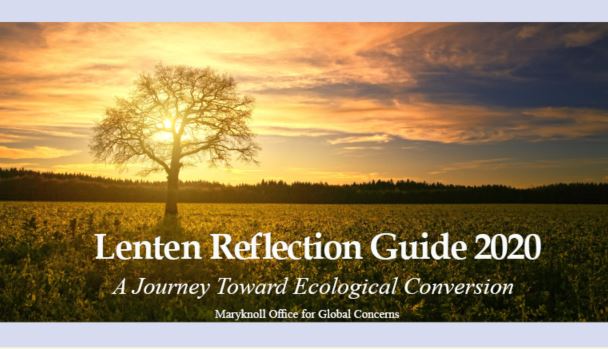Resources
Find resources for Lent, registration for Ecumenical Advocacy Days in April, material to prepare for Earth Day 2020, and much more.
Find resources for Lent, registration for Ecumenical Advocacy Days in April, material to prepare for Earth Day 2020, and much more.
1) Use and share our Lenten Reflection Guide for 2020, “A Journey Towards Ecological Conversion,” featuring prayers, actions, and reflections highlighting the experiences of Maryknoll missioners: http://bit.ly/2020LentGuideMOGC
2) Fight against labor trafficking this Lent by joining the Labeling for Lent Campaign by the Coalition of Catholic Organizations against Human Trafficking. Send a postcard or sign a petition to prompt Sysco, a food corporation, to urge them to ensure their supply chains are free from forced labor: http://bit.ly/Labeling4Lent
3) Register by May 1 for a young adult gathering in Jerusalem June 17-25 hosted by Sabeel, the Palestinian liberation theology movement: http://bit.ly/YASabeelgathering
4) Read a statement by the U.S. Conference of Catholic Bishops on nuclear disarmament in light of Pope Francis’s teaching that the “use and very possession of atomic weapons is immoral:” http://usccb.org/news/2020/020-21.cfm
6) Watch videos of presentations and read a series of blog posts from a conference at Georgetown in February on the Church’s role in advancing global nuclear disarmament: http://bit.ly/PopeandtheBombGT
7) Read a report by Human Rights Watch, “Deported to Danger,” which highlights the more than 138 cases of murder of individuals who were deported to El Salvador from the United States since 2013: http://bit.ly/HRWElSalvador
8) Read Network Lobby’s 2019 Voting Record to see how your representatives voted on issues of economic justice: http://www.networklobby.org/votingrecord2019pdf
9) Register to attend Ecumenical Advocacy Days in Washington, D.C. April 24-27, which will focus on climate change and economic justice: http://bit.ly/EAD2020DC
10) Use and share a Lent resource from the Interfaith Immigration Coalition, “Facing the Future Together,” which focuses on walking with DACA recipients and their families: bit.ly/faith4daca-lent
11) Visit “Pathways to a People’s Economy,” a new online toolkit developed by the New Economy Coalition to support activists and organizers in their efforts to amplify the new economy policy wins happening on the ground and to provide real examples of how to shift our economic conditions from the bottom up: https://peopleseconomy.org/
12) Register for a free, one-hour educational program by the Catholic Climate Covenant on preparing parishes, schools and communities to join in on climate action and advocacy in light of Earth Day 2020, the 50th anniversary of the original Earth Day: http://bit.ly/CCCEarthDay2020
13) Explore our resource page on the Synod on the Amazon and read our statement on Pope Francis’s final Exhortation, “Querida Amazonia:” http://bit.ly/SynodResourcesMOGC
14) Read a new 10-page issue brief produced by Food First/Institute for Food & Development Policy to address the question “How do we grow agroecology from “islands of success” to “seas of change?” http://bit.ly/FoodFirstAG
15) Explore a fact sheet by the Institute for Agriculture and Trade Policy and the National Family Farm Coalition explaining why a carbon market system will not work for the agriculture industry: http://bit.ly/AgCarbonMarkets
16) Read a report by the Othering and Belonging Institute on climate refugees, entitled “Climate Refugees: The Climate Crisis and Rights Denied:” https://belonging.berkeley.edu/climaterefugees
17) Read our latest statements on war with Iran, landmines, U.S. immigration and refugee policy, and more on our website: https://maryknollogc.org/statements
18) Prepare for Laudato Si’ Week, May 16-24, when Catholic communities around the world will be celebrating the fifth anniversary of Pope Francis’s encyclical, Laudato Si’: https://laudatosiweek.org/

